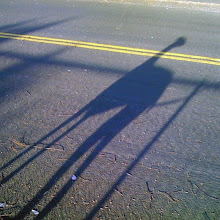The March from Justice to Just Us
Which means it only hits harder. Evidently the original Broadway production back in 1999 was conceived as an epic--big cast, big orchestra--not so big a run, a mere 84 performances. For it can seem cold, as Frank is far from a cuddly hero, and even in the new production (with a good 20% changed material, or so said music and lyrics writer Jason Robert Brown in a post-show discussion) T.R. Knight (yes, from Gray's Anatomy) plays him close to the vest. While we feel for him, we don't really feel him--he's all intellectual in a place where that seems to mean nothing, especially when justice turns out to be a sham.
The secret to the new production, as re-thunk originally for the Domar Warehouse in London, is to go small. The Taper, with its classic thrust stage, is perfect for that, and the tripling of roles and the concise orchestra tucked away above the stage out of sight, makes it hard not to feel implicated, to feel the feeling sometimes the characters themselves seem unable to feel. It's not like you have to reach much to find all the amazing strands of themes: north v. south, racism, anti-semitism, sexism, populism gone vigilante crazy. (Tell me the historic Tom Watson, a virulent racist pamphleteer who makes an appearance in the play, not the golfer, isn't simply a century old forbear of Glenn Beck.) So it's better to focus, keep us with the characters (all the fine acting and siging helps, of course), and let the ideas do their work the way ideas do, in amongst the cracks of lives lived.
For it's a damn 'nother play about love, after all, about how Lucille goes from the plaintive and all-too-real "What Am I Waiting For?" to fighting for her man, despite everything she has to hear about him. Despite the wickedly powerful testimony of the shopgirls, singing their catchy creepy song about how Leo was bad, like a musical threesome version of the scary Shining vision twins. Despite Leo himself, who almost doesn't realize what he has until it's too late.
For forget about justice being blind--just think about love. How we can stare it in the face for years and not know. This even gets rhymed by the governor and his wife, both calling each other jack-asses in the tenderest way imaginable. You can do the right thing and still be damned, and still be in love, the play insists. The parade of history, even with its vicious lynchings, is a parade of love.
Labels: mark taper, parade


0 Comments:
Post a Comment
<< Home